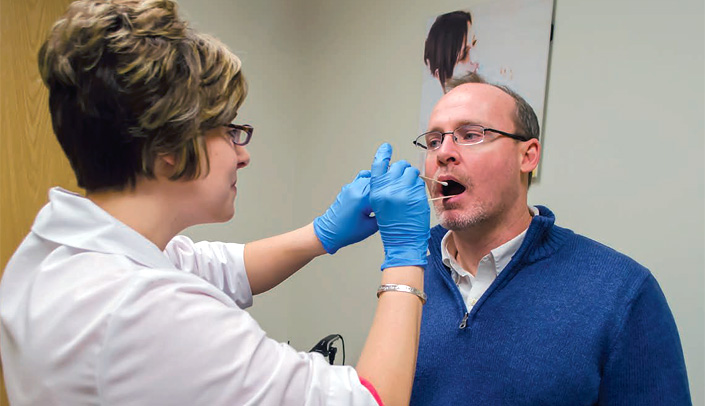My symptoms – chills, aches, fatigue, fever, swollen glands and a particularly icky and painful sore throat – kept getting worse. But I wondered: What if it was simply psychosomatic?
Through my job at UNMC, I’d been talking, reading, writing about strep throat and influenza for months.
I seem to get strep at least every other year, and it hits hard. That’s why I was so excited when Donald Klepser, Ph.D., and Ally Dering-Anderson, Pharm.D., assistant professors of pharmacy practice at the UNMC College of Pharmacy, first told me about their research project several months ago.
Drs. Klepser and Dering-Anderson have a pilot study, in collaboration with Ferris State University and scores of community pharmacies in Michigan, Minnesota and Nebraska. In it, through a collaborative practice agreement between pharmacists and physicians, you or I wouldn’t have to go to a doctor’s office or physician assistant or nurse practitioner’s clinic to get tested for flu or strep.
Instead, we could go to the pharmacy and see a specially-trained pharmacist. With a rapid test, we’d know the results within minutes. And, through the collaborative practice agreement, the pharmacist could then immediately fill a prescription to treat us. All in a single, convenient, walk-in visit.
The pharmacists offer to share this information with your doctor – and if you’re in really bad shape, they’ll refer you on anyway. “This is not to replace physician services,” Dr. Klepser said.
But logic says that we are more likely to seek immediate treatment (and keep infectious diseases from spreading) if it’s convenient. And, with more people having health insurance, under health care reform, physicians, physician assistants and nurse practitioners are going to be more overbooked than ever. A highly-educated, professionally-trained pharmacist can, in this instance, fill the gap.
So, we’d been talking about the program for months. And then, the very week the study was rolling out in Omaha, I could feel the old, familiar symptoms slipping in.
I approached the counter at the Omaha Hy-Vee pharmacy at 108th and Fort streets. Had they started the rapid testing program yet?
The pharmacy tech was excited: Yes, they had! She almost ran to get the paperwork, then stopped, puzzled: Hey, how did you know?
I had an inside tip. (The press release I’d written would hit the news the very next day.)
The pharmacist talked to me, took my vitals and swabbed my throat. It couldn’t have been more than 5 minutes before a pink line appeared: positive.
When I emailed Dr. Dering-Anderson, she replied: “Can I be sorry you have strep and thrilled at the same time?”
The study later confirmed it: I was the first in Omaha to test positive and receive medication per the collaborative practice agreement.
But at the time I was just glad to have been able to walk in, see a trained professional, get tested and start treatment, all in one easy visit. I was then able to look forward to feeling better, thanks to the UNMC study.
